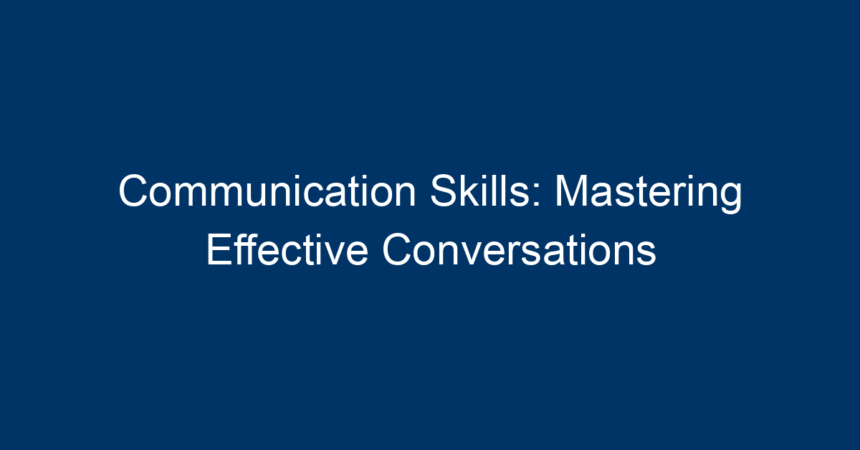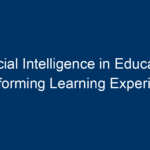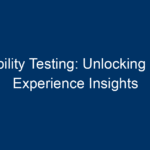In our fast-paced world, the ability to communicate effectively has never been more vital. Whether you’re engaging in personal relationships or professional environments, strong communication skills can significantly enhance your interactions. This article delves into the nuances of effective conversations and provides actionable insights to help you master the art of communication.
Understanding Communication Skills
What Are Communication Skills?
Communication skills encompass various abilities that facilitate the exchange of information between individuals. These include verbal skills, non-verbal cues, active listening, empathy, and clarity. When combined, these elements pave the way for meaningful interactions, fostering connection and understanding.
Why Are Communication Skills Important?
Effective communication skills are essential for numerous reasons. They help in building relationships, enhancing teamwork, resolving conflicts, and improving personal and professional engagements. Strong communicators are often seen as leaders, as they can express their ideas clearly and inspire others.
The Components of Effective Conversations
Verbal Communication Skills
Verbal communication is the cornerstone of any conversation. It’s not just about what you say, but how you say it. Here are some key aspects to consider:
-
Clarity and Conciseness: Strive for clarity in your messages. Avoid jargon and unnecessary complexity; be concise while ensuring your point is understood.
- Tone of Voice: Your tone can significantly impact the message. A warm, friendly tone can enhance receptiveness, while a harsh tone can create barriers.
Non-Verbal Communication Skills
Non-verbal communication often speaks louder than words. Here are some elements to focus on:
-
Body Language: Your posture, facial expressions, and gestures communicate feelings and attitudes. Open body language can invite conversation, while closed posture may suggest defensiveness.
- Eye Contact: Maintaining appropriate eye contact establishes trust and shows your interest. However, be mindful of cultural differences concerning eye contact.
Active Listening
Listening is just as crucial as speaking in effective conversations. Active listening involves:
-
Focusing: Give the speaker your undivided attention. Show that you value their input.
- Reflecting: Paraphrase or summarize their words to show understanding, and ask clarifying questions if needed.
Empathy in Communication
Empathy is the ability to understand and share the feelings of others. It can profoundly impact your conversations:
-
Validation: Acknowledge the speaker’s emotions and experiences. This can foster a stronger connection and mutual understanding.
- Response with Compassion: Tailor your responses to reflect empathy. Sometimes, saying "I understand how you feel" can significantly enhance the interaction.
Mastering the Art of Conversation
Preparing for Conversations
Preparation is key to effective communication. Here are steps to consider:
-
Know Your Audience: Tailor your message according to the specific group you’re addressing. Understanding their background can help you make relevant points.
- Set Clear Objectives: Determine what you want to achieve from the conversation. Whether it’s to inform, persuade, or resolve an issue, having a clear goal can guide your approach.
Engaging in Dialogue
Once you’re prepared, initiate the conversation:
-
Open with a Hook: Start with an engaging opener to draw interest. A relevant personal story or a thought-provoking question can set the tone.
- Encourage Participation: Foster a dialogue rather than a monologue. Ask open-ended questions that encourage deeper exploration of the topic.
Navigating Difficult Conversations
Not all conversations are easy. Here’s how to navigate challenges:
-
Stay Calm and Composed: Approach sensitive topics with a calm demeanor. Your emotional state can greatly affect the outcome.
-
Avoid Negative Language: Use positive or neutral phrases instead of negative language that can lead to defensiveness.
- Focus on Solutions: When conflict arises, shift the discussion towards finding solutions rather than placing blame.
Overcoming Communication Barriers
Identifying Barriers
Barriers to effective communication can stem from various sources, such as:
-
Cultural Differences: Different cultures have unique communication norms that can lead to misunderstandings.
- Emotional Barriers: Personal feelings or biases may cloud judgment and affect how you interpret messages.
Strategies to Overcome Barriers
-
Enhance Cultural Awareness: Educate yourself on cultural variations in communication styles and adapt accordingly.
- Practice Mindfulness: Being aware of your emotions and biases can help in responding more objectively during conversations.
The Role of Technology in Communication
Embracing Digital Communication
In today’s digital age, communication skills extend to virtual platforms. Key elements include:
-
Clarity in Written Communication: Written exchanges should be clear, concise, and well-structured. Avoid overusing jargon and ensure your message is easily digestible.
- Use of Visual Aids: Incorporate tools like videos, infographics, or slideshows to enhance understanding, especially during presentations.
Understanding the Importance of Face-to-Face Interaction
While technology facilitates swift communication, nothing can replace the value of face-to-face interactions. In-person discussions enhance emotional connection and comprehension, making them crucial in sensitive scenarios.
Actionable Insights for Improving Your Communication Skills
-
Practice Active Listening: Engage with others by being a mindful listener. Try summarizing what the speaker has said before responding to ensure clarity.
-
Seek Feedback: Ask friends, family, or colleagues for feedback on your communication style. Constructive criticism can be invaluable for growth.
-
Engage in Role-Playing: Simulate conversations, especially challenging ones, to practice your skills in a low-pressure environment.
-
Continue Learning: Enroll in workshops or courses focused on communication skills. Books and online resources are also beneficial for ongoing improvement.
- Reflect on Your Conversations: After conversations, take a moment to reflect on what went well and what could be improved. Self-awareness is key to growth.
Conclusion
Mastering effective communication skills is a lifelong journey that significantly enriches both personal and professional lives. By understanding the components of effective conversations and actively working to improve your abilities, you’ll find that your interactions become more meaningful and productive. Start implementing the insights discussed in this article, and watch as your communication skills elevate your conversations to a new level. Remember, every conversation is an opportunity to connect, influence, and inspire. Embrace it!




